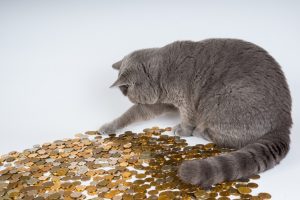The Invisible Paw

The Invisible Paw
I just listened to a Freakonomics podcast “The Invisible Paw”. It’s about what sets humans apart from other animals, and whether other animals engage in what we’d recognize as economic activity.
I think that we can learn a lot from this field of research into animal behavior and behavior of all biological organisms. This research can inform our decisions about how to behave towards animals, towards nature, towards each other and towards ourselves. This research debunks the outdated ideas that we cherish about humans being superior to other life forms. From this information, I extrapolate that we can make no reasonable claim that it could possibly be OK to treat any life forms with less respect and dignity than we would like to be treated ourselves. This is a fundamental application of the Golden Rule.
To listen to the podcast and to read the full transcript, please click https://freakonomics.com/podcast/animal-economics/
Here are two excerpts which I’ve selected from the transcript:
Excerpt 1
In other words, if you don’t like one hairdresser, you can find another one nearby. And the cleaner fish know the difference between visitors and residents.
CRAIR: What’s incredible here is the cleaner wrasses themselves are able to recognize and understand which species of fishes have other options. And they will actually tailor their level of service depending on the competition.
For instance, they might make a resident fish wait while they service a visitor, knowing that a visitor might take his business elsewhere if there’s a line.
BSHARY: And that’s exactly what visitors are doing. If the service is good, there’s a higher chance that you go back to the same station for your next inspection. If the service is lousy, you go to a different station for your next inspection.
CRAIR: They also provide another service too, which is, they use their fins to basically massage the fish they’re servicing. And the predators receive way more tactile stimulation from the cleaner wrasses than the non-predators, and the residents receive much less.
This was exactly what Bshary had been looking for. The client fish were choosing their partners, and the cleaner fish were dialing their service up or down in response to the amount of choice that each client had. And, as economic theory would predict, the client fish with more choice reaped greater benefits.
BSHARY: Obviously, I was extremely excited. I was hoping for this market effect.
But there’s a central tension between cleaner wrasses and their clients.
Excerpt 2
Redouan Bshary has by now spent two decades studying the cleaner wrasse. Long enough to convince him, and his fellow animal behaviorists, that they plainly engage in what humans would recognize as economic transactions. And there’s growing evidence that biological markets exist across a very wide range of animals. Paper wasps, for instance. They live in nests that are controlled by a single queen, and they earn their keep by foraging for food. But: they’re free to go work in another nest if they’d like. The journalist Ben Crair again:
CRAIR: Its labor is sort of the price it pays to get into a nest. If you suddenly double the number of nests, the price should go down.
And that’s exactly what researchers found. When the number of nests in a given area rose, the worker wasps could get away with foraging less.